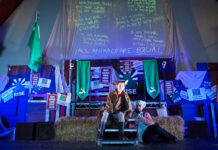Finally, the Oxford Playhouse is open again! And to welcome us back they have something a little different in store – a fully immersive tale of a terrifying global pandemic experienced in the dark by the audience on stage.
A strange choice of subject matter perhaps, as we are (hopefully) just emerging from one, but if the pandemic has taught us anything, it’s how to do things differently and Blindness is certainly different.
“The story depicts more horror than I – perhaps naively – had anticipated”
And that is clear from the word go. In the foyer we are warned to expect 4½ minutes of total darkness at some point during the 70-minute show. We are led outside to the back of the building and through the stage door, to our socially distanced wooden chairs paired up on the stage itself.

The black space is illuminated by a rainbow of pretty light saber-esque lights hanging above our seats, each bathed in a pool of colour, which soon becomes sinister as the performance beings, the bright colours soon replaced by angry flickers of red and vivid white.
“Both face mask and headphones feel a little claustrophobic at first, but I soon to get used to it”
On the wall next to me are the words: ‘If you can see, look. If you can look, observe’.
Nobel Prize-winner José Saramago’s dystopian novel Blindness has been adapted by award-winning playwright Simon Stephen into a sound installation performance by Donmar Warehouse. Directed by Walter Meierjohann, we listen with headphones to immersive binaural sound designed by Ben and Max Ringham.
The recognisable voice of Juliet Stevenson is the lone narrator as a doctor’s wife in this unsettling monologue; vividly portraying the rise and, ultimately, hopeful end to a pandemic.
Both face mask and headphones on feel a little claustrophobic at first, but I soon to get used to it.
“Parts of the narrative make our recent trauma look positively mild in comparison”
The story depicts more horror than I – perhaps naively – had anticipated. There are some gruesome descriptions of everyone infected becoming suddenly blind. Parts of this narrative make our recent trauma look positively mild in comparison.
It feels like a large part of the experience takes place in total darkness. The occasional disturbing flashes of light make my eyes sting – some of the lighting physically moving ominously closer.
At times Stevenson bellows with impressive rage into our ears, the sound levels almost intrusively high. I couldn’t help but jump in my seat at one point. At other moments, I found listening to the tale in the darkness strangely soothing and meditative.
I have the eerie sensation of the character being right at my shoulder, whispering directly to me, pacing back and forth, a buzzing fly and thunder messing with your senses.

I keep my eyes closed as the themes of disbelief, despair, anguish, violence and kindness are blended together in this story that now seems a little less implausible than it once was.
When, towards the end, the curtain slowly rises to reveal the empty auditorium before us, smoke gently wafting between the unoccupied theatre seats, it adds to the apocalyptic feeling – simultaneously beautiful and melancholic to behold.
Stepping out into the warm glow of afternoon sunshine and back into the busy street, I am met with the sight and sound of people chatting and laughing outside pubs and cafes. It takes me a few minutes to gather myself and I feel disorientated on the journey home.
The subject matter might not be for everyone considering what we’ve all collectively just been through, but I for one found BLINDNESS an enthralling experience. NAOMI LANIGHAN
BLINDNESS is on until Saturday 5th June at Oxford Playhouse https://www.oxfordplayhouse.com/whats-on/all-shows/blindness/13834#details


















